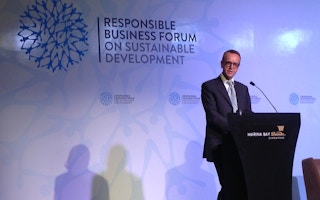Stock exchanges across the world have a key role to play in pushing for good governance and sustainability practice, but efficient capital markets that reward and invest in companies that ‘do the right thing’ are also needed, said Singapore Exchange (SGX) chief executive Magnus Bocker on Tuesday at the Responsible Business Forum on Sustainable Development in Singapore.
Giving the opening speech on the second day of the forum, he acknowledged SGX’s role as the frontline regulator of listed companies, saying SGX will “take the lead” as custodians of corporate responsibility.
“Many look at us and say we need tougher rules and tougher regulations, we need it as part of it, but it’s even more important that we have efficient capital markets,” he said, adding that investors should invest in the companies that behave responsibly, and sell the shares of companies that are not.
He noted that by 2020, the middle class in Asia is expected to triple to 1.5 to 1.7 billion people, and are expected to become the next global consumers and assume the traditional role of the US and European middle classes.
“Can you imagine the dynamic needs and varying demands of such a population? Are we prepared and able to deal what is to come? From now to 2020, Asia needs US$8 trillion of infrastructure investment to meet the needs… So who’s responsible for the future and its needs?” I’m afraid we may all have a part to play,” he told the 500 delegates at the forum held at the Marina Bay Sands Expo and Convention Centre
Recognising that even though the primary responsibility of companies is to make money, he observed that there are a growing number of consumers who want to match their ethical and environmental values with their purchases.
In fact, companies that do not manage their sustainability reputations are also subjecting themselves to operational risk, he said.
But there are some challenges for companies in embracing sustainability. The benefits of such initiatives to a company’s profit and loss statement is difficult to quantify, especially when these strategies also increase costs for companies.
However, there are tools for companies to measure the long-term impact, and the upfront investment is often paid off in cost-savings or improved yields, he added.
For example, the Environmental Defense Fund, a New York-based non-profit has worked with private equity groups such as KKR, Carlyle and Oak Hill Capital Partners to develop a tool that allows private equity investors to integrate social and environmental factors into their investment processes.
“
The immediate challenge is how we can be better at explaining the long-term value of sustainability such that investors are able to understand and take faster action
Magnus Bocker, SGX CEO
Companies are also struggling to explain to analysts and investors that environmental and social responsibility and profitability are not mutually exclusive.
“Perhaps the immediate challenge is how we can be better at explaining the long-term value of sustainability such that investors are able to understand and take faster action,” he said.
He also observed that in Asia, an increasing number of global responsible investment firms are allocating more resources here and regional financial institutions are also monitoring sustainable investment issues and integrating such aspects into their investment policies.
He called on all Singapore-listed companies “to review how they can better disclose and report their environmental, social and governance footprints”.
“Ultimately, transparency and disclosure are part and parcel of responsible business practice,” he said.





















